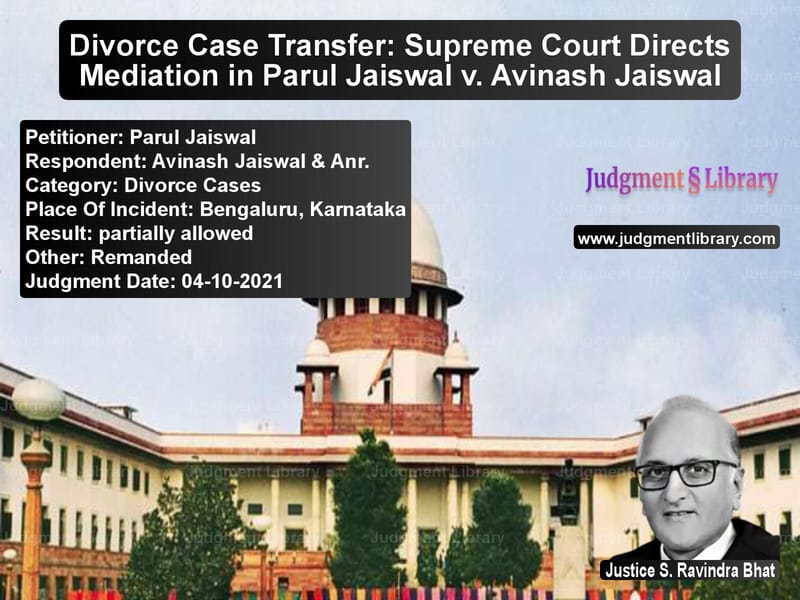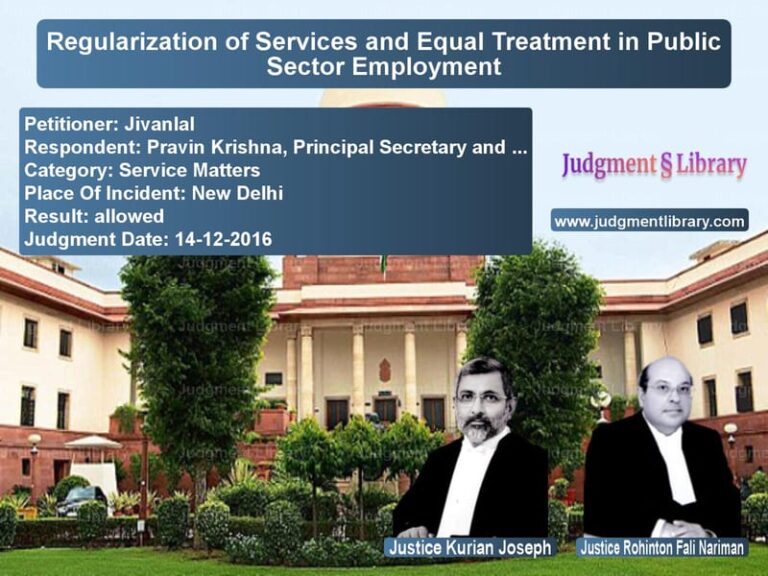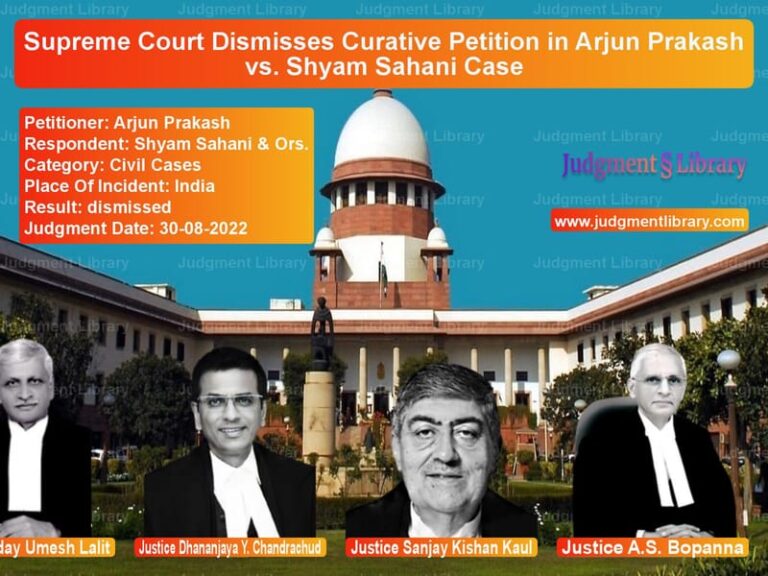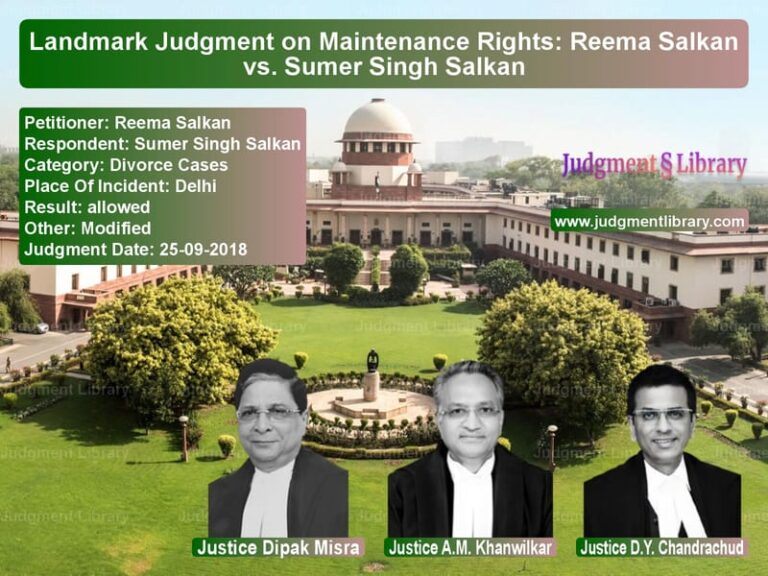Divorce Case Transfer: Supreme Court Directs Mediation in Parul Jaiswal v. Avinash Jaiswal
The Supreme Court of India, in the case of Parul Jaiswal v. Avinash Jaiswal & Anr., ruled on a transfer petition filed by the petitioner-wife, seeking the transfer of a divorce petition filed by the respondent-husband. The case, registered as Transfer Petition (Civil) No. 2189 of 2019, was disposed of on October 4, 2021. The Court issued important directions for mediation, emphasizing amicable settlement before proceeding with the trial.
Background of the Case
The case involved a marital dispute where the respondent-husband, Avinash Jaiswal, had filed a divorce petition in the Vth Additional Principal Judge, Family Court, Bengaluru, Karnataka. The petitioner-wife, Parul Jaiswal, sought the transfer of the case to a competent court in Allahabad, Uttar Pradesh, citing personal difficulties in attending proceedings in Bengaluru.
The Supreme Court had earlier stayed the proceedings at the Family Court, Bengaluru, by an interim order on September 11, 2019. The Court, after hearing both parties, decided against transferring the case but directed mediation proceedings to explore the possibility of a settlement.
Legal Issues Examined
- Whether the petitioner-wife was entitled to have the case transferred to Allahabad.
- Whether mediation should be mandated before proceeding with the divorce trial.
- Whether online mediation proceedings would be feasible given the location of both parties.
- Whether financial assistance should be granted to the petitioner for travel and legal expenses.
Petitioner’s (Parul Jaiswal) Arguments
The petitioner’s counsel submitted the following arguments before the Court:
- She faced severe financial and logistical difficulties in traveling from Allahabad to Bengaluru for court proceedings.
- She had no independent source of income and was completely dependent on her family.
- Conducting proceedings in Bengaluru would cause undue hardship and inconvenience.
- Given the circumstances, the case should be transferred to Allahabad, where she would have legal and emotional support.
Respondent’s (Avinash Jaiswal) Arguments
The respondent opposed the transfer petition on the following grounds:
- The original divorce petition was filed in Bengaluru, where he resided and worked.
- Transferring the case to Allahabad would cause significant inconvenience to him.
- Virtual hearings and online mediation could resolve the issue without needing a physical transfer.
- The respondent was willing to pay travel expenses for the petitioner to attend necessary hearings.
Supreme Court’s Observations
The Supreme Court carefully weighed the arguments from both sides before issuing its ruling.
On the Transfer Request
The Court recognized the petitioner’s difficulties but also considered the respondent’s logistical concerns. Instead of transferring the case, the Court opted for mediation, ruling:
“Having heard the learned counsel for the parties and considered the pleadings, this Court is of the opinion that in the larger interest of justice, orders for the conduct of the proceedings are warranted.”
On Mediation as a Priority
The Court emphasized that mediation should be the first course of action before proceeding with trial, stating:
“The Family Court at Bengaluru, before which the proceedings in M.C. No. 5296 of 2018 are pending and were stayed by this Court by order dated 11.09.2019, shall now proceed with the matter. However, in the first instance, the parties shall be referred to the Mediation Centre.”
Online Mediation and Virtual Hearings
Recognizing the geographical challenges faced by both parties, the Court mandated online mediation for the next 10 weeks:
“The mediation proceedings shall be conducted online on such date(s) as are convenient to the parties and the concerned Mediator(s). Such proceedings shall be concluded within 10 weeks.”
Further Proceedings if Mediation Fails
The Supreme Court provided a clear roadmap in case mediation was unsuccessful:
“In case of a settlement, the Family Court at Bengaluru, which is seized of the proceedings, shall pass orders having regard to the settlement arrived at between the parties.”
“In case no settlement is arrived at or the mediation proceedings remain inconclusive, the Family Court shall take up the proceedings and continue with them in accordance with law, after the said period of 10 weeks.”
Financial Assistance to the Petitioner
The Court acknowledged the financial hardship faced by the petitioner and directed the respondent to pay her travel expenses:
“In case the presence of the petitioner is required on any particular date, the Family Court at Bengaluru shall fix date(s) convenient to the petitioner. In such an event, the Family Court shall ensure that the petitioner is paid Rs.10,000/- (Rupees Ten Thousand Only) for every date of hearing when she will be required to remain present for recording of her evidence and/or for such other purposes as are necessary.”
The respondent-husband was ordered to pay this amount to facilitate the petitioner’s participation in court proceedings.
Final Judgment
The Supreme Court ruled:
- The divorce case would not be transferred to Allahabad.
- The Family Court at Bengaluru was directed to conduct mediation proceedings for 10 weeks.
- Online mediation would be arranged to accommodate both parties.
- If mediation failed, the Family Court would resume hearing the case.
- The respondent must pay Rs.10,000 per hearing to cover the petitioner’s travel costs if her physical presence was required.
Significance of the Judgment
- Encourages Mediation in Matrimonial Cases: The ruling prioritizes mediation to help estranged couples resolve disputes amicably.
- Addresses Financial Challenges: By mandating financial assistance for travel, the Court ensures fairness in matrimonial litigation.
- Promotes Virtual Hearings: Recognizes the effectiveness of online mediation and court proceedings.
- Ensures Fairness for Both Parties: The decision balances the interests of both spouses instead of favoring one side.
Conclusion
The Supreme Court’s ruling in Parul Jaiswal v. Avinash Jaiswal sets an important precedent in family law, reinforcing the importance of mediation before litigation. By allowing virtual mediation and ensuring financial support for the petitioner, the judgment provides a fair and equitable approach to handling divorce proceedings. This case will serve as a model for future matrimonial disputes where geographical constraints and financial hardships affect one of the parties.
Petitioner Name: Parul Jaiswal.Respondent Name: Avinash Jaiswal & Anr..Judgment By: Justice S. Ravindra Bhat.Place Of Incident: Bengaluru, Karnataka.Judgment Date: 04-10-2021.
Don’t miss out on the full details! Download the complete judgment in PDF format below and gain valuable insights instantly!
Download Judgment: parul-jaiswal-vs-avinash-jaiswal-&-an-supreme-court-of-india-judgment-dated-04-10-2021.pdf
Directly Download Judgment: Directly download this Judgment
See all petitions in Mutual Consent Divorce
See all petitions in Alimony and Maintenance
See all petitions in Child Custody
See all petitions in Judgment by S Ravindra Bhat
See all petitions in partially allowed
See all petitions in Remanded
See all petitions in supreme court of India judgments October 2021
See all petitions in 2021 judgments
See all posts in Divorce Cases Category
See all allowed petitions in Divorce Cases Category
See all Dismissed petitions in Divorce Cases Category
See all partially allowed petitions in Divorce Cases Category







